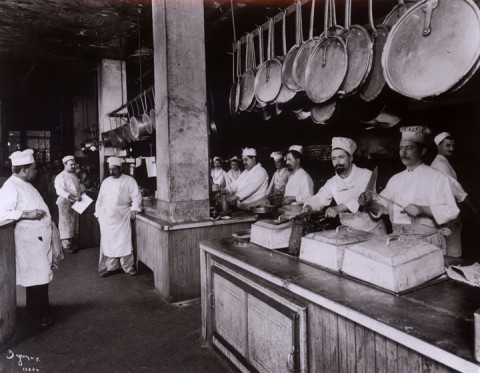Bridget Sandorford is a freelance writer and researcher for Culinaryschools.org, where recently she’s been researching culinary schools in America. In her spare time, she enjoys biking, painting and working on her first cookbook.

You don’t have to be a professional chef to cook like one. You can learn a great many things from the masters to become a star in your own kitchen — all without attending culinary school. There are so many resources online now — from YouTube to blogs to e-books — that you can learn to master cooking techniques, recipes, and other cooking skills from the comfort of your own home.
What you learn depends on what you’re interested in and what your aptitudes are. However, here are a few useful (and simple) lessons that home cooks can learn from professional kitchens:
Keep a Clear Work Space
No matter how busy it gets in the kitchen, you need a clear workspace in order to create successful meals. A cluttered workspace means you can’t get to the ingredients you need quickly, perhaps throwing off the delicate timing of some dishes. It also means that you may experience some cross-contamination, either throwing off your recipe or posing allergy risks.
A cluttered workspace also makes things more stressful for the chef, which can interfere with focus and lead to hasty execution. It is important to have a clear and orderly workspace to allow for the best working conditions.
Be Precise
Some chefs are able to wing it after years and years of practice and innovation. However, most of them know that it is important to follow recipes carefully for the success of a dish. A little too much (or too little) baking powder can influence the fluffiness of a cake. Whipping eggs at the wrong temperature or the wrong speed will mean they won’t form peaks.
There are many ways that not following the directions carefully can lead to the failure of your dish. It is important to be precise in everything you do, following the recipe to the letter. The only time to deviate is when you are intentionally experimenting (and are willing to fail in the pursuit).
Monitor Temperatures Carefully
If you’re like me — an amateur (and a bit lazy) chef — you might see that a recipe calls for the oven to be set at 450F and you turn the dial then throw the dish in the oven. Unfortunately, this throws off the cooking time, and it could even threaten the success of the dish entirely. If it has to be cooked at 450F, the temp should be 450F — not warming up to 450F. Even if you leave the dish in longer, the lower temps might slow cook the inside when the outside was meant to have a golden crust while the inside stayed a bit soft. This could change the whole composition of your dish.
It is important to monitor your temperatures carefully, so that your dish is cooked exactly to the specifications listed. Otherwise, your dish could fail.
Use Quality Ingredients
Cheap olive oil doesn’t have the same flavor as an artisan brand you purchase in Italy. Out-of-season tomatoes won’t taste as robust as those you grew in your own garden from heirloom seeds. Choosing quality ingredients can make all the difference to your meals.
You don’t have to fly to Italy to source olive oil, but you should choose the best quality available in your local market. You don’t have to grow your own tomatoes, but you should purchase produce that is grown locally and in season. Always choose the highest quality ingredients, and you will make the best meals.
Stay Organized
If your kitchen is a mess, it will be hard to ensure that you are using the best ingredients or to be efficient. You may allow pantry items to grow stale without realizing it. Or you may end up buying items in bulk because you don’t realize you already have them.
Take the time to organize your kitchen (and keep it that way), and you will ensure that your kitchen runs smoothly and you create the best quality meals for you and your family.
You don’ t have to work in a professional kitchen to learn lessons from the professionals. These tips can help you operate your personal kitchen just like the pros so you can create beautiful, healthy and amazing meals that your family will love and that will impress your guests.